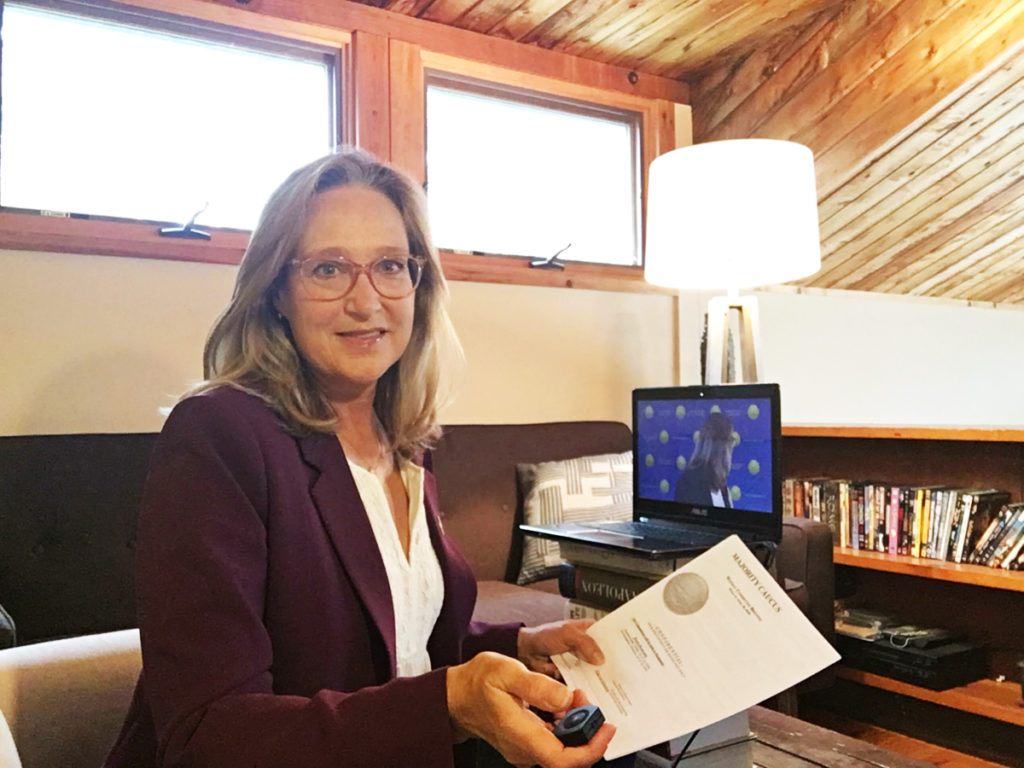Q&A: County Legislator Bridget Fleming says more testing is essential in reopening the economy

Suffolk County Legislator Bridget Fleming, who represents Shelter Island, recently sent a letter to the county executive regarding the need for more testing for COVID-19 in Suffolk County. Over the weekend, she discussed the issue in more detail.
Q: In your April 10 letter to County Executive Steve Bellone, you say that, despite the fact that 40,000 tests have been administered in the county, “we have been forced to chase the virus in a manner that has seen untold suffering and economic loss, with more devastation on the horizon.” Can you explain the role more tests might have played in limiting the impact of COVID-19 in the county?
The Centers for Disease Control [and Prevention] issued its first warning about COVID-19 on January 8, and the first U.S. case was confirmed in Washington State on January 20. But as much as a month later — at the end of February — there had been fewer than 500 tests conducted nationwide.
By March 8, when we had the first positive test result in Suffolk County, the virus clearly had been present and spreading in our communities, but health authorities were still extremely limited as to who could be tested.
I believe delays in widespread testing prevented local authorities from being able to implement a strategy of surveillance testing and tracking of contacts that may have allowed health officials to contain the early spread of the virus.
Q: How many tests do you believe the county might have needed? How far short did 40,000 fall?
I don’t know that I could give an exact number, but Suffolk County has 1.5 million residents. Clearly, more testing capability was needed then and is still needed.
Q: Moving forward, how does the role of testing change in setting the stage for a resumption of social and economic activities? Is testing even more important moving forward than it is today?
Yes. There’s no question that we need widespread testing to prevent more waves of infection once we are able to restart the economy.
Q: We have heard, anecdotally, about the lack of testing in nursing homes in particular. Is that of even greater significance?
Absolutely. I asked early on that we fight for the capability of testing every resident of nursing homes and other vulnerable populations. It just wasn’t possible, because the tests were not available.
Q: What can be done to improve the availability of testing? What could Mr. Bellone do? What other levels of government must act to improve the situation, and what must they do?
The county executive has done an extraordinary job managing this crisis, as I pointed out in my letter. And now, as a county, I believe we need to speak with one voice about the urgency of getting more testing.
We need the federal government to invoke the Defense Procurement Act, or take other federal measures to speed the development and production of adequate testing. We need a sense of urgency and true leadership in the federal administration and the CDC and [Food and Drug Administration] to make up for lost time and start to get ahead of the spread once physical distancing really has the impact of slowing the transmission of the virus.
… The intention of my letter was to emphasize my support for all-hands-on-deck efforts to strongly advocate for support from the federal government for expansion of testing capacity. It was in no way meant to be critical of the efforts underway by the county or the state.
Q: You mention, in your letter, the “extreme anxiety” in the community, particularly among vulnerable populations, because of an absence of tests. Is it important to have “testing on demand”?
That would certainly be ideal. But supplies are limited, and so tough decisions need to be made around priorities. If the president had acted competently and with a sense of urgency, health care workers trying to help vulnerable populations wouldn’t find themselves in that position.
Q: Is having tests manufactured by Northwell Health an important benefit for communities on Long Island? Does it offer improved access?
Yes. The capability to test must be granted to as many labs as is responsibly possible. There was a lot of time lost in January and February in achieving those approvals.
Q: You talk in your letter about the pending restart of the economy. How do you envision that happening locally, and what role will testing play? Will employers be asked or required to test employees before they can return to work? Will the government play a role in that? And what happens to those who still test negative — will there be protections for them in the workplace?
I would look to the health experts to advise how we can safely normalize life and how we can make best use of testing resources. The numbers are still going up in Suffolk County. We’re just not there yet, but I hope we will be soon if we all continue to behave responsibly.
Q: This is likely not the last pandemic we will face. What have we learned from the COVID-19 response that will be beneficial next time? What successes and failures will be helpful in future fights?
Well, I believe we still have a lot to learn, and America has great doctors and scientists who will guide us. But it is clear that dismantling the Pandemic Response team in the White House, cutting funding for the CDC, and failing to act with urgency in January and February to locate and contain the spread of this deadly and highly contagious threat were enormous mistakes that must never be repeated.








